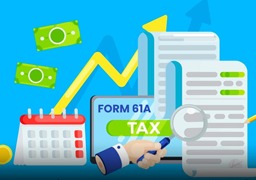# tin
12 posts in `tin` tag
Income Tax Deductions: Sections 80TTA and 80TTB
This blog post provides a comprehensive overview of Sections 80TTA and 80TTB of the Income Tax Act and their impact on income tax exemptions and deductions. It covers the key features of each section, including the deduction limits, eligible taxpayers, and the types of interest income that qualify.
The post explains how individuals (other than senior citizens) and Hindu Undivided Families (HUFs) can claim a deduction of up to ₹10,000 on interest earned from savings accounts under Section 80TTA. It also highlights the higher deduction limit of up to ₹50,000 for resident senior citizens aged 60 and above under Section 80TTB.

Tax-Efficient Investing: A Guide to Optimizing Your Portfolio for Long-Term Growth
Learn how to optimize your portfolio for long-term growth while minimizing your tax liability. This comprehensive guide covers tax-exempt instruments, tax-deferred options, and tax-efficient strategies to help you achieve your financial goals.

Maximizing Tax Benefits: How to Claim Deductions Under Section 10AA of the Income Tax Act
Section 10AA of the Income Tax Act provides substantial tax deductions for units operating in Special Economic Zones (SEZs). This blog details the eligibility criteria, steps to compute the deduction, and the necessary compliance requirements for claiming these tax benefits. It covers the phased deduction structure, documentation needed, and the overall benefits of leveraging Section 10AA. Perfect for business owners and professionals looking to optimize their tax liabilities while promoting export-oriented growth.

Navigating GST for Content Creators & YouTubers: A Comprehensive Guide to Income Taxation
This article provides an in-depth guide to GST on YouTube income, AdSense, brand promotions, and affiliate marketing in India. It covers GST rates, compliance, and refunds for content creators, helping them navigate the complex tax landscape.

Mastering Depreciation Calculation on WDV Under the Income Tax Act
In this comprehensive guide, we delve into the intricacies of calculating depreciation on the Written Down Value (WDV) of a block of assets under the Income Tax Act. Depreciation is a key component of financial management, representing the gradual wear and tear of assets over time. This blog explores the essential elements involved in WDV depreciation calculation, including the initial cost of assets, residual value, useful life, and prescribed depreciation rates. Through practical examples and step-by-step explanations, we equip taxpayers with the knowledge needed for accurate financial reporting and tax compliance. Understanding how to calculate depreciation correctly ensures businesses can effectively manage their asset values and adhere to tax regulations

Stay GST Compliant: A Breakdown of June 2024 Return Filing Deadlines
This blog post serves as a one-stop resource for businesses in India navigating the Goods and Services Tax (GST) regime. It provides a clear understanding of various GST return types and their applicability. The core focus is on the crucial due dates for filing GST returns in June 2024. A well-organized table summarizes the deadlines for each return type, along with a brief description and applicability criteria. The blog emphasizes the importance of staying updated on potential changes to these deadlines by referring to the official GST portal.

Understanding Note 7A: A Complete Taxpayer’s Guide for AY 2024-2025
Filing your income tax return for the Assessment Year 2024-2025 can be simplified with a clear understanding of Note 7A. This comprehensive guide explains how to accurately report income from other sources, claim deductions under Chapter VI-A, declare exempt income, and provide details about foreign assets and income. By following this step-by-step approach, taxpayers can ensure compliance with tax laws, minimize errors, and avoid potential issues with the tax authorities. Whether you're dealing with interest income, dividends, foreign assets, or various tax deductions, this guide has you covered for a smooth and successful tax filing experience.

Tax Evasion vs. Tax Fraud: Understanding the Differences and Importance of Reporting Tax Evasion
Tax evasion and tax fraud are two common forms of tax-related crimes. While they may seem similar, they have distinct meanings and consequences. Tax evasion involves the use of illegal means to avoid paying taxes, while tax fraud involves the intentional misrepresentation of information on a tax return. This blog post explores thedifferences between tax evasion and tax fraud, and the importance of reporting tax evasion.

Understanding the New Scrutiny Guidelines for ITRs (FY 2024-25)
The new scrutiny guidelines for ITRs (FY 2024-25) provide transparency in the tax department's functioning and bring in a data-driven approach for identifying cases for scrutiny assessment. This blog post demystifies the new scrutiny guidelines for ITRs (FY 2024-25) and provides a comprehensive guide for taxpayers to ensure that they are compliant with the tax laws and avoid any potential scrutiny.

Understanding Penalties for Under-reporting and Misreporting Income under Section 270A of the Income Tax Act
Section 270A of the Income Tax Act imposes penalties on taxpayers who under-report or misreport their income. This blog post provides a detailed explanation of the provisions of Section 270A, including the definition of under-reported income, the instances of under-reporting, and the calculation of the penalty. It also discusses the consequences of non-compliance and provides tips for avoiding penalties.

Form 61A: Statement of Specified Financial Transactions (SFT) Under Section 285BA of the Income Tax Act, 1961
Form 61A is a statement of specified financial transactions (SFTs) under Section 285BA of the Income Tax Act, 1961. It is used to capture information on certain high-value transactions as prescribed in the Income Tax Act. This blog post covers the details of Form 61A, the transactions that should be reported, the format of the form, and the consequences of non-compliance.

Section 80TTA vs Section 80TTB: A Comprehensive Comparison | Income Tax Act, 1961
This blog post will provide a detailed comparison of Section 80TTA and Section 80TTB of the Income Tax Act, 1961. The post will cover the key differences between the two sections, including their eligibility criteria, deduction limits, and the types of accounts that qualify for deductions. The post will also provide a brief overview of the Income Tax Act and the role of deductions in reducing tax liability.
